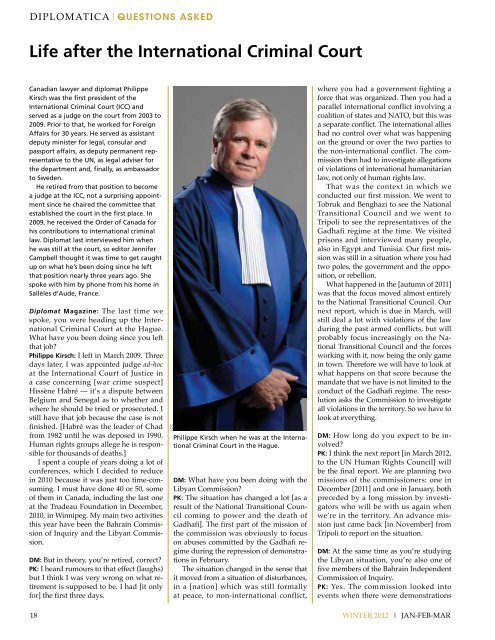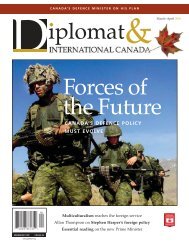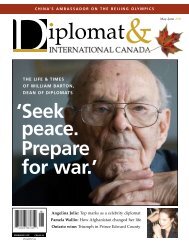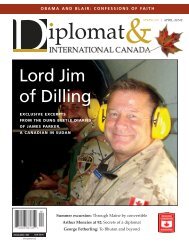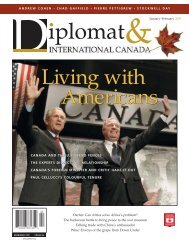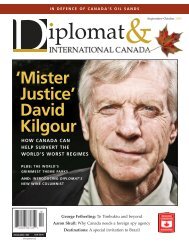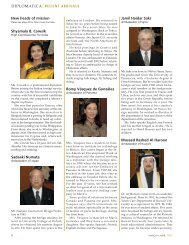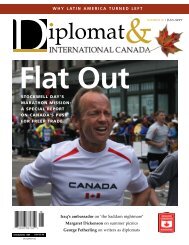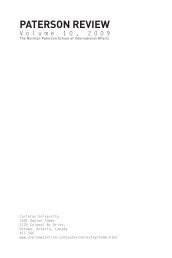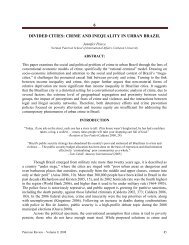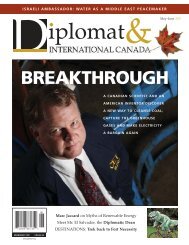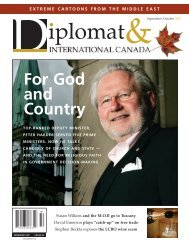John Baird: Canada's freedom agenda - Diplomat Magazine
John Baird: Canada's freedom agenda - Diplomat Magazine
John Baird: Canada's freedom agenda - Diplomat Magazine
You also want an ePaper? Increase the reach of your titles
YUMPU automatically turns print PDFs into web optimized ePapers that Google loves.
DIPLOMATICA|QUESTIONS AskedLife after the International Criminal CourtCanadian lawyer and diplomat PhilippeKirsch was the first president of theInternational Criminal Court (ICC) andserved as a judge on the court from 2003 to2009. Prior to that, he worked for ForeignAffairs for 30 years. He served as assistantdeputy minister for legal, consular andpassport affairs, as deputy permanent representativeto the UN, as legal adviser forthe department and, finally, as ambassadorto Sweden.He retired from that position to becomea judge at the ICC, not a surprising appointmentsince he chaired the committee thatestablished the court in the first place. In2009, he received the Order of Canada forhis contributions to international criminallaw. <strong>Diplomat</strong> last interviewed him whenhe was still at the court, so editor JenniferCampbell thought it was time to get caughtup on what he’s been doing since he leftthat position nearly three years ago. Shespoke with him by phone from his home inSallèles d'Aude, France.<strong>Diplomat</strong> <strong>Magazine</strong>: The last time wespoke, you were heading up the InternationalCriminal Court at the Hague.What have you been doing since you leftthat job?Philippe Kirsch: I left in March 2009. Threedays later, I was appointed judge ad-hocat the International Court of Justice ina case concerning [war crime suspect]Hissène Habré — it’s a dispute betweenBelgium and Senegal as to whether andwhere he should be tried or prosecuted. Istill have that job because the case is notfinished. [Habré was the leader of Chadfrom 1982 until he was deposed in 1990.Human rights groups allege he is responsiblefor thousands of deaths.]I spent a couple of years doing a lot ofconferences, which I decided to reducein 2010 because it was just too time-consuming.I must have done 40 or 50, someof them in Canada, including the last oneat the Trudeau Foundation in December,2010, in Winnipeg. My main two activitiesthis year have been the Bahrain Commissionof Inquiry and the Libyan Commission.DM: But in theory, you’re retired, correct?PK: I heard rumours to that effect (laughs)but I think I was very wrong on what retirementis supposed to be. I had [it onlyfor] the first three days.18ICCPhilippe Kirsch when he was at the InternationalCriminal Court in the Hague.DM: What have you been doing with theLibyan Commission?PK: The situation has changed a lot [as aresult of the National Transitional Councilcoming to power and the death ofGadhafi]. The first part of the mission ofthe commission was obviously to focuson abuses committed by the Gadhafi regimeduring the repression of demonstrationsin February.The situation changed in the sense thatit moved from a situation of disturbances,in a [nation] which was still formallyat peace, to non-international conflict,where you had a government fighting aforce that was organized. Then you had aparallel international conflict involving acoalition of states and NATO, but this wasa separate conflict. The international allieshad no control over what was happeningon the ground or over the two parties tothe non-international conflict. The commissionthen had to investigate allegationsof violations of international humanitarianlaw, not only of human rights law.That was the context in which weconducted our first mission. We went toTobruk and Benghazi to see the NationalTransitional Council and we went toTripoli to see the representatives of theGadhafi regime at the time. We visitedprisons and interviewed many people,also in Egypt and Tunisia. Our first missionwas still in a situation where you hadtwo poles, the government and the opposition,or rebellion.What happened in the [autumn of 2011]was that the focus moved almost entirelyto the National Transitional Council. Ournext report, which is due in March, willstill deal a lot with violations of the lawduring the past armed conflicts, but willprobably focus increasingly on the NationalTransitional Council and the forcesworking with it, now being the only gamein town. Therefore we will have to look atwhat happens on that score because themandate that we have is not limited to theconduct of the Gadhafi regime. The resolutionasks the Commission to investigateall violations in the territory. So we have tolook at everything.DM: How long do you expect to be involved?PK: I think the next report [in March 2012,to the UN Human Rights Council] willbe the final report. We are planning twomissions of the commissioners: one inDecember [2011] and one in January, bothpreceded by a long mission by investigatorswho will be with us again whenwe’re in the territory. An advance missionjust came back [in November] fromTripoli to report on the situation.DM: At the same time as you’re studyingthe Libyan situation, you’re also one offive members of the Bahrain IndependentCommission of Inquiry.PK: Yes. The commission looked intoevents when there were demonstrationsWINTER 2012 | JAN-FEB-MAR


